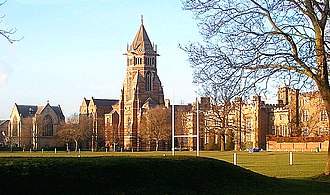
Back مدرسة عامة (المملكة المتحدة) Arabic Public School (Vaeinigts Kinireich) BAR Public school Catalan Nezávislá škola Czech Public School (Vereinigtes Königreich) German Public school (Unuiĝinta Reĝlando) Esperanto Public school Spanish مدرسه عمومی (بریتانیا) Persian Public school Finnish Public school (Royaume-Uni) French
A request that this article title be changed to Public school (England) is under discussion. Please do not move this article until the discussion is closed. |

A public school in England and Wales is a type of fee-charging private school[1] originally for older boys. They are "public" in the sense of being open to pupils irrespective of locality, denomination or paternal trade or profession; nor are they run for the profit of a private owner.
Although the term "public school" has been in use since at least the 18th century,[2] its usage was formalised by the Public Schools Act 1868,[a][3] which put into law most recommendations of the 1864 Clarendon Report. Nine prestigious schools were investigated by Clarendon (including two day schools, Merchant Taylors' and St Paul's) and seven subsequently reformed by the Act: Eton, Shrewsbury, Harrow, Winchester, Rugby, Westminster, and Charterhouse.[4][5]
Public schools are elite institutions and are associated with the ruling class.[6][7][8] Historically, public schools produced many of the military officers and administrators of the British Empire.[9][10] In 2019, two-thirds of cabinet ministers of the United Kingdom had been educated at such fee-charging schools.[11] In Scotland, a public school has a different significance; there the term is typically synonymous with state school in England and Wales. Fee-charging schools are referred to as private or independent schools.[12]
- ^ "PUBLIC SCHOOL | English meaning - Cambridge Dictionary".
- ^ Cite error: The named reference
Flemingwas invoked but never defined (see the help page). - ^ "Text of the Public Schools Act 1868". education-uk.org. Gillard D (2018) Education in the UK: a history. Archived from the original on 3 June 2024. Retrieved 22 May 2024.
- ^ Kynaston, David (20 January 2021). "A history of private schools and reform". www.pepf.co.uk. Private Education Policy Forum.
- ^ Roach, John (1991). Secondary education in England, 1870-1902 : public activity and private enterprise. London: Routledge. ISBN 0-203-40552-8. OCLC 252881458.
- ^ Social Mobility Commission. "Elitist Britain 2019: the educational pathways of Britain's leading people (summary)". www.gov.uk. GOV.UK.
- ^ Jamieson, Alistair (26 June 2019). "UK has 'low social mobility' and is run by private school elite — report". euronews.
- ^ Walford, Geoffrey (June 1986). "Ruling-class Classification and Framing". British Educational Research Journal. 12 (2): 183–195. doi:10.1080/0141192860120207. S2CID 146433863.
- ^ Winslow Jr., Stanley Blakeley (1 May 2010). A Boy's Empire: The British Public school as imperial training ground, 1850-1918 (Thesis). doi:10.18130/V3KF83.[page needed]
- ^ Griggs, Clive (January 1994). "The Influence of British Public Schools on British Imperialism". British Journal of Sociology of Education. 15 (1): 129–136. doi:10.1080/0142569940150108. JSTOR 1393353.
- ^ Walker, Amy (25 July 2019). "Two-thirds of Boris Johnson's cabinet went to private schools". The Guardian.
- ^ "Scottish Education and School Systems". www.scotland.org. Scottish Government.
Cite error: There are <ref group=lower-alpha> tags or {{efn}} templates on this page, but the references will not show without a {{reflist|group=lower-alpha}} template or {{notelist}} template (see the help page).